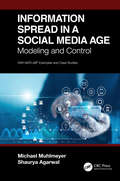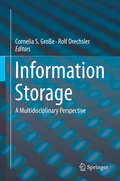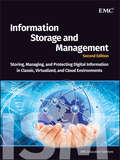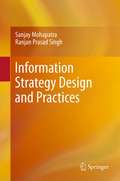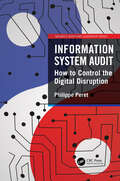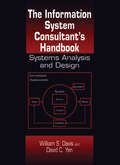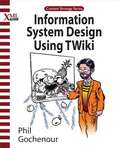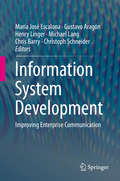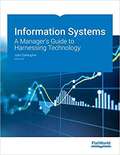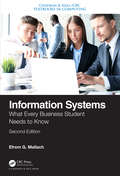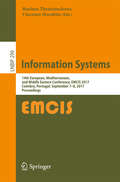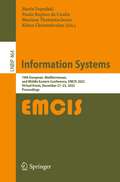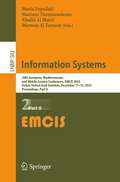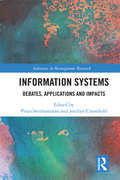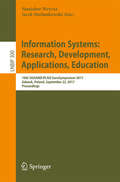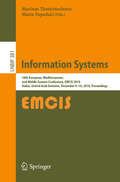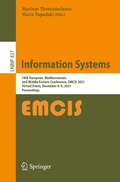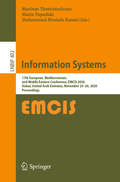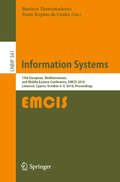- Table View
- List View
Information Spread in a Social Media Age: Modeling and Control
by Michael Muhlmeyer Shaurya AgarwalThe rise of social networks and social media has led to a massive shift in the ways information is dispersed. Platforms like Twitter and Facebook allow people to more easily connect as a community, but they can also be avenues for misinformation, fake news, and polarization. The need to examine, model, and analyze the trajectory of information spread within this new paradigm has never been greater. This text expands upon the authors’ combined teaching experience, engineering knowledge, and multiple academic journal publications on these topics to present an intuitive and easy to understand exploration of social media information spread alongside the technical and mathematical concepts. By design, this book uses simple language and accessible and modern case studies (including those centered around United States mass shootings, the #MeToo social movement, and more) to ensure it is accessible to the casual reader. At the same time, readers with prior knowledge of the topics will benefit from the mathematical model and control elements and accompanying sample simulation code for each main topic. By reading this book and working through the included exercises, readers will gain a general understanding of modern social media systems, network fundamentals, model development techniques, and social marketing. The mathematical modeling of information spread over social media is heavily emphasized through a review of existing epidemiology and marketing based models. The book then presents novel models developed by the authors to account for modern social media concerns such as community filter bubbles, strongly polarized groups, and contentious information spread. Readers will learn how to build and execute simple case studies using Twitter data to help verify the text’s proposed models. Once the reader is armed with a fundamental understanding of mathematical modeling and social media-based system considerations, the book introduces more complex engineering control concepts, including controller design, PID control, and optimal control. Examples of control methods for social campaigns and misinformation mitigation applications are covered in a step-by-step format from problem formulation to solution simulation and results discussions. While many of the examples and methods are framed in the context of controlling social media information spread, the material is also directly applicable to many different types of controllable systems. With the essential background, models, and tools presented within, any interested reader can take the first steps toward exploring and taming the growing complexity of the modern social media age.
Information Storage: A Multidisciplinary Perspective
by Cornelia S. Große Rolf DrechslerThis book examines some of the underlying processes behind different forms of information management, including how we store information in our brains, the impact of new technologies such as computers and robots on our efficiency in storing information, and how information is stored in families and in society. The editors brought together experts from a variety of disciplines. While it is generally agreed that information reduces uncertainties and that the ability to store it safely is of vital importance, these authors are open to different meanings of “information”: computer science considers the bit as the information block; neuroscience emphasizes the importance of information as sensory inputs that are processed and transformed in the brain; theories in psychology focus more on individual learning and on the acquisition of knowledge; and finally sociology looks at how interpersonal processes within groups or society itself come to the fore. The book will be of value to researchers and students in the areas of information theory, artificial intelligence, and computational neuroscience.
Information Storage and Management: Storing, Managing, and Protecting Digital Information in Classic, Virtualized, and Cloud Environments
by Emc Education ServicesThe new edition of a bestseller, now revised and update throughout! This new edition of the unparalleled bestseller serves as a full training course all in one and as the world's largest data storage company, EMC is the ideal author for such a critical resource. They cover the components of a storage system and the different storage system models while also offering essential new material that explores the advances in existing technologies and the emergence of the "Cloud" as well as updates and vital information on new technologies. Features a separate section on emerging area of cloud computing Covers new technologies such as: data de-duplication, unified storage, continuous data protection technology, virtual provisioning, FCoE, flash drives, storage tiering, big data, and more Details storage models such as Network Attached Storage (NAS), Storage Area Network (SAN), Object Based Storage along with virtualization at various infrastructure components Explores Business Continuity and Security in physical and virtualized environment Includes an enhanced Appendix for additional information This authoritative guide is essential for getting up to speed on the newest advances in information storage and management.
Information Strategy Design and Practices
by Ranjan Prasad Singh Sanjay MohapatraInformation Strategy Design and Practices develops a framework for designing information technology strategy for an organization. Beyond this, it establishes an approach to not only implement it, but sustain it. The framework explains how IT strategy should have an alignment to business to reap the benefits of business. The book contains five case studies in different domains: retail, real estate development, IT product development, development sector, and education sector. These case studies have been applied to different countries, providing a global prospective to this emerging trend.
Information System Audit: How to Control the Digital Disruption (Security, Audit and Leadership Series)
by Philippe PeretThe digitalization of companies is a recurrent topic of conversation for managers. Companies are forced to evolve at least as fast as their competitors. They have to review their organization, their processes, and their way of working. This also concerns auditors in terms of their audit strategy and working methods. Digitalization is the tip of the iceberg that represents the increasing reliance on information technology of the company’s information system. Companies have seen new competitors succeed with a digital approach, competitors that have opened new markets or new ways of interacting with their customers, and all business processes can be digitalized. In this new paradigm, auditors have to renew themselves too. Long gone are the days of auditors specializing in one technique, like financial auditors or IT auditors. This makes it a phenomenal opportunity for auditing to renew itself, embracing the vision of the company’s information system: long live the information system auditors! This book proposes you to go step by step from a common understanding of our history of auditing to gradually defining and justifying the impacts of digitalization on the audit strategy and the preparation of audits.
The Information System Consultant's Handbook: Systems Analysis and Design
by William S. Davis David C. YenThe Information System Consultant's Handbook familiarizes systems analysts, systems designers, and information systems consultants with underlying principles, specific documentation, and methodologies.Corresponding to the primary stages in the systems development life cycle, the book divides into eight sections:PrinciplesInformation Gathering and Problem DefinitionProject Planning and Project ManagementSystems AnalysisIdentifying AlternativesComponent DesignTesting and ImplementationOperation and MaintenanceEighty-two chapters comprise the book, and each chapter covers a single tool, technique, set of principles, or methodology. The clear, concise narrative, supplemented with numerous illustrations and diagrams, makes the material accessible for readers - effectively outlining new and unfamiliar analysis and design topics.
Information System Design Using Twiki
by Phillip GochenourPhil Gochenour combines real-world experience designing enterprise information systems with a veteran teacher's ability to explain the basic principles behind any system design, whether it's a cookbook or a software company's wiki. Information System Design Using TWiki takes the reader through a step-by-step project starting with the basic building block of all information systems, the topic, and continuing with sections on metadata, search systems, and usability. The companion website provides sample code that can be used to construct the complete project on the TWiki wiki platform, making it possible for readers to understand TWiki's functionality and potential while constructing a usable system. Whether you are looking for a way to learn the basics of information system design, or you work with TWiki and want to learn how to use it more effectively, this book is for you.
Information System Development: Improving Enterprise Communication
by María José Escalona Gustavo Aragón Henry Linger Michael Lang Chris Barry Christoph SchneiderInformation System Development--Improving Enterprise Communication are the collected proceedings of the 22nd International Conference on Information Systems Development: Improving Enterprise Communication--ISD 2013 Conference, held in Seville, Spain. It follows in the tradition of previous conferences in the series in exploring the connections between industry, research and education. These proceedings represent ongoing reflections within the academic community on established information systems topics and emerging concepts, approaches and ideas. It is hoped that the papers herein contribute towards disseminating research and improving practice. The conference tracks highlighted at the 22nd International Conference on Information Systems Development (ISD 2013) were: Applications Data and Ontologies End Users Enterprise Evolution Industrial cases in ISD Intelligent Business Process Management Model Driven Engineering in ISD New Technologies Process Management Quality
Information Systems: A Manager's Guide to Harnessing Technology, Version 3.0
by John GallaugherWHAT'S NEW IN 3.0:<P><P> UPDATED, MORE RELEVANT INFORMATION:<P> New coverage including Uber, WhatsApp, Facebook, and bitcoin breathes fresh life into existing material. The popular Zara and Netflix case studies remain but contain refreshed information.<P> EMPHASIS ON SOCIAL MEDIA:<P> Instagram, SnapChat, WhatsApp, Tinder, Secret, and Whisper all receive mention, ensuring relevancy and proper understanding of the current field.<P> MOBILE VS. DESKTOP:<P> In a number of renamed chapters, Gallaugher weighs the pros and cons of social media use on desktop computers and mobile devices, prompting classroom dialogue surrounding the rise of different technologies and how businesses and managers adjust to emerging trends.<P> DISCUSSION OF THE SHARING ECONOMY:<P> With the addition of an entirely new chapter focused on the sharing economy, Gallaugher introduces examples of citizens coming together to create or share resources across markets.<P> For a comprehensive list of what's new in version 3.0, visit Gallaugher’s blog.<P> John Gallaugher of Boston College was one of BusinessWeek’s “Professors of the Year.” His widely popular textbook offers a proven approach that has garnered student praise and increased information systems enrollment. There is no other Information Systems author today who keeps his text as "up-to-the-month" current. <P> For regular updates, follow Gallaugher’s blog, The Week in Geek, and connect with him on Twitter at @gallaugher.<P> This textbook is suitable for these courses:Undergraduate or graduate courses in Management Information Systems and Information Technology<P> This textbook is suitable for 2 and 4 year institutions.<P> PEDAGOGICAL FEATURES:<P> FOCUS ON STRATEGIC THINKING:<P> Rather than lead with technical topics, the book starts with strategic thinking, focusing on big-picture issues that have confounded experts but will engage students.<P> ENGAGING CASE STUDIES:<P> While chapters introduce concepts, cases on approachable, exciting firms across industries further challenge students to apply what they've learned.<P> CUSTOMIZABILITY:<P> The Flat World Knowledge publishing model allows instructors to adapt the textbook to the exact needs of their specific class and student body. <P>
Information Systems: A Manager's Guide to Harnessing Technology, v. 5.0
by John GallaugherWHAT'S NEW IN 5.0:<P><P> FRESHLY UPDATED:<P> Every chapter has received an update to ensure that it covers the latest topics and material. Today’s cutting edge firms and headline grabbing topics are presented through durable frameworks and concepts.<P> WORLDWIDE TRENDS IN TECH DEVELOPMENTS:<P> Included are updates and statistics on companies and technologies being developed around the world. China started the century as a nation largely unplugged and offline, but now has more internet users than any other country. In Sub-Saharan Africa, 70% of the population lives within mobile cell phone coverage. Now, even drones are affordable enough to be used as a delivery system in places with poor infrastructure.<P> PROTEUS, A PILL CAMERA:<P> A mini-case in the “Moore’s Law and More” chapter discusses the launch of Proteus’s low cost and efficient “PillCam.” Using small sensors and powered by digestive acids, the pill allows doctors to see a unique perspective inside the human body (literally).<P> SOCIAL MEDIA POWERHOUSE:<P> Statistics on the massive amount of new social networks and acquisitions in the marketplace have all been updated. New content includes Microsoft’s acquisition of LinkedIn, Slack’s dominant presence in the business space, and the rise of companies like HubSpot. New subsections discuss Twitter and the rise of microblogging, as well as Facebook’s dominant news feed and its strong position against Google’s advertising monopoly.<P> CUTTING EDGE COVERAGE:<P> From Facebook’s move to make Messenger a platform to Google’s evolution to Alphabet, students will feel their text and classroom are alive with the most current content available.<P> For a comprehensive list of what's new in version 5.0, visit Gallaugher’s blog.<P> John Gallaugher of Boston College has been named one of Entrepreneur Magazine’s “Gurus to Grads.” His popular and award-winning textbook offers a proven approach that has garnered student praise and increased information systems enrollment. Each year Gallaugher meets with scores of tech industry executives from Silicon Valley to sub-Saharan Africa, and there is no other Information Systems author today who keeps his text as "up-to-the-month" current. <P> For regular updates, follow Gallaugher’s blog, The Week in Geek, and connect with him on Twitter at @gallaugher.<P> This textbook is suitable for these courses:Undergraduate or graduate courses in Management Information Systems and Information Technology<P> This textbook is suitable for 2 and 4 year institutions.<P> PEDAGOGICAL FEATURES:<P> FOCUS ON STRATEGIC THINKING:<P> Rather than lead with technical topics, the book starts with strategic thinking, focusing on big-picture issues that have confounded experts but will engage students.<P> CURRENT, ENGAGING AND HOLISTIC CASE STUDIES:<P> While chapters introduce concepts, cases on approachable, exciting firms across industries further challenge students to apply what they've learned. Students love how concepts are introduced in a text that reads more like Wired and the Wall Street Journal than a conventional textbook.<P> CONCEPTS:<P> Chapters cover not only strategy and technology basics, but critical and cutting edge concepts such as data analytics, security, social media, the sharing economy, disruptive innovation, network effects and platform creation, open source, and cloud computing.<P> FASCINATING FIRMS:<P> In-depth profiles include firms that students know and are eager to learn more about. Amazon, Facebook, Google, Netflix, Rent the Runway, and Zara are among the firms that get extended coverage, along with mini-cases on Airbnb, Uber, and more.<P> CUSTOMIZABILITY:<P> The Flat World Knowledge publishing model allows instructors to adapt the textbook to the exact needs of their specific class and student body. See how easy it is to customize a textbook in this 4 minute demo: Flat World Editing Platform Video Demo
Information Systems: A Manager’s Guide to Harnessing Technology
by John GallaugherThe text offers a proven approach that has garnered student praise, increased IS enrollment, and engaged students to think deeper and more practically about the space where business and technology meet. Every topic is related to specific business examples, so students gain an immediate appreciation of its importance. Rather than lead with technical topics, the book starts with strategic thinking, focusing on big-picture issues that have confounded experts but will engage students. And while chapters introduce concepts, cases on approachable, exciting firms across industries further challenge students to apply what they've learned, asking questions like: Why was NetFlix able to repel Blockbuster and WalMart? How did Harrah's Casino's become twice as profitable as comparably-sized Caesar's, enabling the former to acquire the latter? How does Spain's fashion giant Zara, a firm that shuns the sort of offshore manufacturing used by every other popular clothing chain, offer cheap fashions that fly off the shelves, all while achieving growth rates and profit margins that put Gap to shame? What's an IPO and can a technology alternative push out investment bankers and insiders to the benefit of entrepreneurs and small investors? Why is Google more profitable than Disney? Is Facebook really worth $15 billion?
Information Systems: A Manager's Guide to Harnessing Technology Version 8.0
by John GallaugherKey Features: *Unique approach to information systems by leading with strategic thinking before diving into technical topics *Current and engaging case studies that challenge students to apply what they’ve learned *Coverage of not only strategy and technology basics, but also of critical concepts including data analytics, security, social media, the sharing economy, disruptive innovation, network effects and more *In-depth profiles on widely known firms such as Facebook, Amazon, Google, Netflix, Rent the Runway, and Zara.
Information Systems: A Manager's Guide to Harnessing Technology version 1.2
by John GallaugherInformation Systems: A Manager's Guide to Harnessing Technology V1.2 is intended for use in undergraduate and/or graduate courses in Management Information Systems and Information Technology. Version 1.2 of John's book retains the same structure and theory of version 1.1, but refreshes key statistics, examples, and brings case material up to date (vital when covering firms that move as fast as Facebook, Google, and Netflix). Adopting version 1.2 guarantees your students will have the most current text on the market, drawing real and applicable lessons from material that will keep your class offerings current and accessible.
Information Systems: A Manager's Guide to Harnessing Technology version 1.3
by John GallaugherInformation Systems: A Manager's Guide to Harnessing Technology V 1.3 is intended for use in undergraduate and/or graduate courses in Management Information Systems and Information Technology. Version 1.3 of John's book retains the same structure and theory of version 1.1 and V 1.2, but refreshes key statistics, examples, and brings case material up to date (vital when covering firms that move as fast as Facebook, Google, and Netflix). For example; the Netflix chapter - Updates address the major changes impacting Netflix in 2011, including the response to the firm's pricing changes, the failed Qwikster service split, recent developments impacting the streaming and DVD-by-mail businesses, a comparison table detailing the stark differences between the firm's two offerings (DVD & streaming), updated statistics, learning objectives, and additional exercises and updates to the Google chapter - Updated text/images for currency, additional sub-sections on the firm's Google+ launch and the acquisition of Motorola Mobility. Adopting version 1.3 guarantees your students will have the most current text on the market, drawing real and applicable lessons from material that will keep your class offerings current and accessible.
Information Systems: A Manager's Guide to Harnessing Technology version 1.4
by John GallaugherInformation Systems: A Manager’s Guide to Harnessing Technology V 1.4 is intended for use in undergraduate and/or graduate courses in Management Information Systems and Information Technology. Version 1.4 of John's book retains the same structure and theory of the earlier versions, but Version 1.4 updates key statistics and examples, and includes up-to-date case material, such as Pinterest and Facebook’s Instagram acquisition. Adopting version 1.4 guarantees your students will have the most current text on the market, drawing real and applicable lessons from material that will keep your class offerings current and accessible.
Information Systems: What Every Business Student Needs to Know, Second Edition (Chapman & Hall/CRC Textbooks in Computing)
by Efrem G. MallachMost information systems textbooks overwhelm business students with overly technical information they may not need in their careers. This textbook takes a new approach to the required information systems course for business majors. For each topic covered, the text highlights key "Take-Aways" that alert students to material they will need to remember during their careers. Sections titled "Where You Fit In" and "Why This Chapter Matters" explain how the topics being covered will impact students on the job. Review questions, discussion questions, and summaries are also included. This second edition is updated to include new technology, along with a new running case study. Key features: Single-mindedly for business students who are not technical specialists Doesn&’t try to prepare IS professionals; other courses will do that Stresses the enabling technologies and application areas that matter the most today Based on the author&’s real-world experience Up to date regarding technology and tomorrow&’s business needs This is the book the author—and, more importantly, his students—wishes he had when he started teaching. Dr. Mallach holds degrees in engineering from Princeton and MIT, and in business from Boston University. He worked in the computer industry for two decades, as Director of Strategic Planning for a major computer firm and as co-founder/CEO of a computer marketing consulting firm. He taught information systems in the University of Massachusetts (Lowell and Dartmouth) business schools for 18 years, then at Rhode Island College following his retirement. He consults in industry and serves as Webmaster for his community, in between hiking and travel with his wife.
Information Systems: 14th European, Mediterranean, and Middle Eastern Conference, EMCIS 2017, Coimbra, Portugal, September 7-8, 2017, Proceedings (Lecture Notes in Business Information Processing #299)
by Marinos Themistocleous and Vincenzo MorabitoThis book constitutes selected papers from the 14th European, Mediterranean, and Middle Eastern Conference, EMCIS 2017, held in Coimbra, Portugal, in September 2017. EMCIS is focusing on approaches that facilitate the identification of innovative research of significant relevance to the IS discipline following sound research methodologies that lead to results of measurable impact. The 37 full and 16 short papers presented in this volume were carefully reviewed and selected from a total of 106 submissions. They are organized in sections on big data and Semantic Web; digital services, social media and digital collaboration; e-government; healthcare information systems; information systems security and information privacy protection; IT governance; and management and organizational issues in information systems.
Information Systems: 19th European, Mediterranean, and Middle Eastern Conference, EMCIS 2022, Virtual Event, December 21–22, 2022, Proceedings (Lecture Notes in Business Information Processing #464)
by Maria Papadaki Paulo Rupino da Cunha Marinos Themistocleous Klitos ChristodoulouThis book constitutes selected papers from the 19th European, Mediterranean, and Middle Eastern Conference, EMCIS 2022, which was held virtually during December 7-8, 2022.EMCIS covers technical, organizational, business, and social issues in the application of information technology and is dedicated to the definition and establishment of Information Systems (IS) as a discipline of high impact for IS professionals and practitioners. It focuses on approaches that facilitate the identification of innovative research of significant relevance to the IS discipline following sound research methodologies that lead to results of measurable impact. The 47 papers presented in this volume were carefully reviewed and selected from a total of 136 submissions. They were organized in topical sections named: Artificial intelligence; big data and analytics; blockchain technology and applications; cloud computing; digital governance; digital services and social media; emerging computing technologies and trends for business process management; enterprise systems; information system security and information privacy protection; innovative research projects; IT governance and alignment; management and organizational issues in information systems; and metaverse.
Information Systems: 20th European, Mediterranean, and Middle Eastern Conference, EMCIS 2023, Dubai, United Arab Emirates, December 11-12, 2023, Proceedings, Part II (Lecture Notes in Business Information Processing #502)
by Maria Papadaki Marinos Themistocleous Khalid Al Marri Marwan Al ZarouniThis book constitutes selected papers from the 20th European, Mediterranean, and Middle Eastern Conference, EMCIS 2023, which was held in Dubai, UAE, during December 11-12, 2023. EMCIS covers technical, organizational, business, and social issues in the application of information technology and is dedicated to the definition and establishment of Information Systems (IS) as a discipline of high impact for IS professionals and practitioners. It focuses on approaches that facilitate the identification of innovative research of significant relevance to the IS discipline following sound research methodologies that lead to results of measurable impact. The 43 papers presented in this volume were carefully reviewed and selected from a total of 126 submissions. They were organized in topical sections as follows: Part I: Metaverse; blockchain technology and applications; digital governance; healthcare information systems; artificial intelligence; Part II: Big data and analytics; digital services and social media; innovative research projects; managing information systems; smart cities.
Information Systems: Debates, Applications and Impacts
by Priya Seetharaman Jocelyn CranefieldThis book captures a range of important developments that have occurred in Information Systems over the last forty years, with a particular focus on India and the developing world. Over this time, Information and Communications Technology (ICT) and Information Systems (IS) have come to play a critical role in supporting, complementing and automating managerial decisions, shaping and transforming industries, and contributing to deep societal and economic change. This volume examines a range of topics for those interested in the adoption and use of these technologies across varied situations. It combines empirical studies on the application and impact of IS with commentaries, debates and insights on the transformative role that IT and the IT industry have played, and continue to play, within India as well as globally. The book draws attention to issues and challenges that organizations grapple with in tech-enabled environments, and provides insights on the role of automation and computational techniques. It explores the global impact of the technology revolution on economic growth and development, electronic globalization, and the wider opportunities and challenges of a hi-tech world. The chapters cover various themes such as e-government in India, internet-based distribution systems, internet banking, and use of collaborative IT tools and functions to support virtual teams in the software industry and the business process outsourcing industry. Other chapters focus on methodological advances, such as systems thinking which finds applications in organizational decision-making, and the use of fuzzy logic. This volume will interest professionals and scholars of information technology and information systems, computer studies, IT systems, economics, and business and management studies.
Information Systems: 10th SIGSAND/PLAIS EuroSymposium 2017, Gdansk, Poland, September 22, 2017, Proceedings (Lecture Notes in Business Information Processing #300)
by Stanisław Wrycza and Jacek MaślankowskiThis book constitutes the refereed proceedings of the 10th SIGSAND/PLAIS EuroSymposium 2017 titled Information Systems: Research, Development, Applications, and Education, held in Gdansk and Sopot, Poland, on September 27, 2017.The objective of the EuroSymposium on Systems Analysis and Design is to promote and develop high quality research on all issues related to analysis and design (SAND). It provides a forum for SAND researchers and practitioners in Europe and beyond to interact, collaborate, and develop their field. The 10 papers presented in this volume were carefully reviewed and selected from 45 submissions.They are organized in topical sections on data analytics, Web-based information systems, and information systems development.
Information Systems: 16th European, Mediterranean, and Middle Eastern Conference, EMCIS 2019, Dubai, United Arab Emirates, December 9–10, 2019, Proceedings (Lecture Notes in Business Information Processing #381)
by Marinos Themistocleous Maria PapadakiThis book constitutes selected papers from the 16th European, Mediterranean, and Middle Eastern Conference, EMCIS 2019, held in Dubai, UAE, in October 2019. EMCIS is dedicated to the definition and establishment of Information Systems as a discipline of high impact for the methodical community and IS professionals, focusing on approaches that facilitate the identification of innovative research of significant relevance to the IS discipline.The 48 full papers presented in this volume were carefully reviewed and selected from a total of 138 submissions. They were organized in topical sections named: Big Data and Analytics; Blockchain Technology and Applications; Cloud Computing; Digital Services and Social Media; e-Government; Enterprise Information Systems; Health-Care Information Systems; Information Systems Security and Information Privacy Protection; Innovative Research Projects; IT Governance; and Management and Organizational Issues in Information Systems.
Information Systems: 18th European, Mediterranean, and Middle Eastern Conference, EMCIS 2021, Virtual Event, December 8–9, 2021, Proceedings (Lecture Notes in Business Information Processing #437)
by Marinos Themistocleous Maria PapadakiThis book constitutes selected papers from the 18th European, Mediterranean, and Middle Eastern Conference, EMCIS 2021, which took place during December 8-9, 2021. The conference was initially planned to take place in Dubai, UAE, but had to change to an online event due to the COVID-19 pandemic.EMCIS covers technical, organizational, business, and social issues in the application of information technology and is dedicated to the definition and establishment of Information Systems (IS) as a discipline of high impact for IS professionals and practitioners. It focuses on approaches that facilitate the identification of innovative research of significant relevance to the IS discipline following sound research methodologies that lead to results of measurable impact. The 54 full papers presented in this volume were carefully reviewed and selected from a total of 155 submissions. They were organized in topical sections named: Big Data and Analytics; Blockchain Technology and Applications; Cloud Computing; Digital Governance; Digital Services and Social Media; Emerging Computing Technologies and Trends for Business Process Management; Healthcare Information Systems; Information Systems security and Information Privacy Protection; Innovative Research Projects; IT Governance and Alignment; and Management and Organisational Issues in Information Systems.
Information Systems: 17th European, Mediterranean, and Middle Eastern Conference, EMCIS 2020, Dubai, United Arab Emirates, November 25–26, 2020, Proceedings (Lecture Notes in Business Information Processing #402)
by Marinos Themistocleous Maria Papadaki Muhammad Mustafa KamalThis book constitutes the proceedings papers from the 17th European, Mediterranean, and Middle Eastern Conference on Information Systems, EMCIS 2020, held in Dubai, UAE, in November 2020. Due to the COVID-19 pandemic the conference took place virtually.EMCIS focuses on approaches that facilitate the identification of innovative research of significant relevance to the Information Systems discipline following sound research methodologies that lead to results of measurable impact.The 56 papers presented in this volume were carefully reviewed and selected from a total of 161 submissions to the main conference. They are grouped in section on Big Data and Analytics, Blockchain Technology and Applications, Digital Government, Digital Services and Social Media, Emerging Computing Technologies and Trends for Business Process Management, Enterprise Systems, Healthcare Information Systems, Information Systems Security and Information Privacy Protection, Innovative Research Projects, Management and Organisational Issues in Information Systems.
